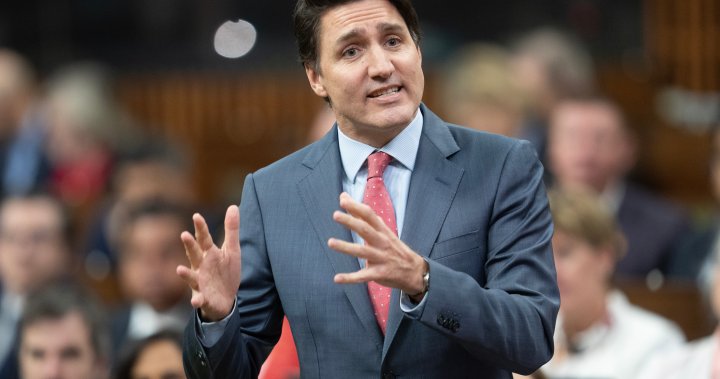The 2024 federal budget failed to spark a much-needed rebound in the polls for Prime Minister Justin Trudeau’s trailing Liberal party, according to new Ipsos polling released Tuesday.
Canadian reaction to the Liberal government’s latest spending plans shows an historic challenge ahead of the governing party as it tries to keep the reins of government out of the Conservative party’s hands in the next election, according to one pollster.
“If the purpose of the budget was to get a political reboot going, it didn’t seem to happen,” says Darrell Bricker, CEO of Ipsos Global Public Affairs.
A symbolic ‘shrug’ for Budget 2024
The 2024 federal budget tabled last week included billions of dollars in new spending aimed at improving “generational fairness” and rapidly filling in Canada’s housing supply gap.
Ipsos polling conducted exclusively for Global News shows voters’ reactions to the 2024 federal budget mostly ranged from lacklustre to largely negative.
After stripping out those who said they “don’t know” how they feel about the federal budget (28 per cent), only 17 per cent of Canadians surveyed about the spending plan in the two days after its release said they’d give it “two thumbs up.” Some 40 per cent, meanwhile, said they’d give it “two thumbs down” and the remainder (43 per cent) gave a symbolic “shrug” to Budget 2024.
Ipsos polling shows few Canadians give Budget 2024 “two thumbs up.”
Ipsos / Global News
“Thumbs down” reactions rose to 63 per cent among Alberta respondents and 55 per cent among those in Saskatchewan and Manitoba.
Some 10 per cent of respondents said the budget would personally help them, while 37 per cent said it would hurt, after again stripping out those who said they didn’t know what the impact would be.
Asked about how they’d vote if a federal election were held today, 43 per cent of respondents said they’d pick the Conservatives, while 24 per cent said they’d vote Liberal, followed by 19 per cent who’d lean NDP.

The Conservative lead is up one point from a month earlier, Bricker notes, suggesting that Budget 2024 failed to stem the bleeding for the incumbent Liberals.
Financial news and insights
delivered to your email every Saturday.
Only eight per cent of respondents to the Ipsos poll said the budget made them more likely to vote Liberal in the upcoming election, while roughly a third (34 per cent) said it made them less likely.
“The initial impressions of Canadians are that it hasn’t made much of a difference,” Bricker says.
Sentiment towards the Liberals remains slightly higher among generation Z and millennial voters — the demographics who appeared to be the focus of Budget 2024 — but Bricker says opinions remain “overwhelmingly negative” across generational lines.
Heading into the 2024 budget, the Liberals were under pressure to improve affordability in Canada amid a rising cost of living and an inaccessible housing market, Ipsos polling conducted last month showed.
The spending plan included items to remove junk fees from banking services and concert tickets, as well as some items aimed at making it easier for first-time homebuyers to break into the housing market. It also included a proposed change to how some capital gains are taxed, which the Liberals have claimed would target the wealthiest Canadians.
Paul Kershaw, founder of Generation Squeeze, told Global News after the federal budget’s release that while he was encouraged by acknowledgements about the economic unfairness facing younger demographics, there is no quick fix for the affordability crisis in the housing market.

A steep hill for Liberals to climb
Trudeau, his cabinet ministers and Liberal MPs have hit the road both before and after the budget’s release to promote line items in the spending plan.
Bricker says this is the typical post-budget playbook, but so far it looks like there’s nothing that “really caught on with Canadians” in the early days after the release of the spending plans. The Liberals have a chance to make something happen on the road, he says, but it’s “not looking great.”
“Maybe over the course of the next year, they’ll be able to demonstrate that they’ve actually changed something,” he says.
Bricker notes, however, that public opinion has changed little in federal politics over the past year.
The next federal election is set for October 2025 at the latest, but could be called earlier if the Liberals fail a confidence vote or bring down the government themselves.
But a vote today would see the Liberals likely lose to a “very, very large majority from the Conservative party,” Bricker says.

“What we’re seeing is, if things continue on as they’ve been continuing for the space of the last year, that they will end up in a situation where, almost an historic low in terms of the number of seats,” he says.
The Conservatives are leading in every region in the country, except for Quebec, where the Bloc Quebecois holds the pole position, according to the Ipsos polling.
The Liberals are meanwhile facing “a solid wall of public disapproval,” Bricker says. Some 32 per cent of voters said they would never consider voting Liberal in the next election, higher than the 27 per cent who said the same about the Conservatives, according to Ipsos.
Typically, Bricker says an incumbent party can hold onto a lead in some demographic, age group or region and build out a strategy for re-election from there.
But this Liberal party lacks any foothold in the electorate, making prospects look grim in the next federal election; it’s so bleak that he even invokes the Progressive Conservative party’s historic rout in the 1993 vote.
“The hill they have to climb is incredibly hard,” Bricker says.
“I haven’t seen a hill this high to climb in federal politics since Brian Mulroney was faced with a very similar situation back in 1991 and ’92. And we all know what happened with that.”











